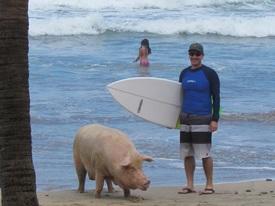Running and Losing Weight
Replies
-
Part of it is in how fast you run as well. It is all about the heart rate! What most people would consider HIIT training is my normal pace (7.5 to 8.5 minute miles). In running at this speed I maintain my HR between 160 and 175 @ 38 years old. I do lift as well and am not saying not to do both, but you still have alot you can gain with cardio. You just have to get out of your comfort zone with it. Your body is used to what you have been doing for the last year plus.0
-
My workouts are around ~3 hours long because I'm training for an endurance event. I may be anywhere from 500-2000 calories 'in deficit' because I can't eat back that many calories. But, I'm pretty much at a standstill, which is exactly what a lot of people see when they do a LOT of cardio.
A lot of cardio puts you at risk of losing muscle before losing fat. Search for studies of endurance athletes. They'll lose a significant percent of muscle without a single drop in body fat. But, this is the extreme.
There are a few additional reasons that you might have been at a standstill from just cardio. Did you have pre-workout meals? Having a meal 60-90 min before a run is important because you don't use up your whole glycogen stores. Any long workouts need protein immediately after, or even mid-way through if its over 60-90 minutes long. Protein helps repair muscles almost 20% faster if you had it within the 30-min window after the workout.
A huge point: were you going by what MFP said you burned or a BodyMedia/BodyBugg/HRM? MFP quotes me WAY higher than my actual burn, and I still ate to a 500 cal deficit every day. Incorrect estimations for food or workouts can easily wipe out your daily progress.
Theres a lot of things that could have caused your plateau, but definitely adding weight lifting helped you through it. Running alone doesn't cause a standstill. Either way it seems you broke through your plateau.0 -
To answer a few questions:
- I had gotten comfortable with my running pace, so I've been running intervals at 6.0 or 6.5 mph (my comfy pace is around 5.0) and that's helped to really push me. I've also had some trouble with allergies and my exercise asthma and not being able to give it my all when I run.
- I do use an HRM
- I do think food as well had something to do it with it. But it seems the plateau busting was a combination of a few factors, the most drastic being the change in exercise routine.0 -
I would say it's the mix of running and strength training. Your body will work to become efficient at actions and movements it does frequently. By switching it up, especially with strength training and building lean muscle, your body has to change and readapt, therefore overcoming your plateau. Congrats
 0
0 -
The biggest factor is settling into a moderate-effort steady state cardio routine. It's not the running per se, but I would suspect more the steady-state routine you were in.
Plenty of people see an immediate and dramatic effect when they take up running. Why? Because running is a high-intensity activity and they were probably working at a much lower level.
Many people can get a similar effect from just adding more higher-intensity intervals.
In this case the higher-intensity work is likely what got you going and the fact that it represented a change from your routine.0 -
It's important to exercise caution when drawing conclusions from the effects of a change in routine. Often, it is the type of change that is responsible, not the specific activity.
It would be wrong to assume-- because someone switched from a mostly steady-state aerobic program to an interval circuit training program and saw an improvement -- that "all cardio is bad" or that "running eats your muscle" or "HIIT is the best exercise". I have seen plenty of people become stagnant on a steady routine of HIIT training and see big changes when they included some steady-state endurance training back into their routines.
A balanced routine--endurance cardio, tempo cardio, interval cardio, resistance training--will provide the best results for most people.0 -
I've personally always seen better results when I strength train vs. just cardio. And I've always heard the more muscle, the more fat you burn and the more muscle you have the faster your metabolism.0
-
My $.02:
A couple of 3-4 mile runs per week isn't going to melt off the pounds, as the calories burned are pretty modest (perhaps 100 - 125 calories per mile depending on your weight).
For me (a guy who typically runs ~ 50 miles per week) it all comes down to simple math. Burn more than I eat and I lose, eat more that I burn and I gain.
I do lift weights a couple times a week as well.0 -
Last fall I decided to take up running seriously and train for a half marathon with the "side benefit" of losing weight. I'd ran 5Ks in the past, so why not right? This worked out for a while, but...
My issue, over time, with training for a half marathon program earlier this year was the increased appetite. I couldn't create a deficit without feeling like I was going to go into a hunger rage. I was running about 32 miles per week at my peak. I was eating at maintenance level and above (compensating for the increase in activity over a normal strength training routine as I'd been used to). There was no balance the more I trained; longer I ran. I lost a good deal of the muscle definition in my arms that I was previously quite proud of. I went from being able to easily complete 30 push-ups to struggling with 10. In the weeks leading up to the half, my form started to suffer and I was feeling pretty crappy. Ran the half anyway, got 12 miles thru, had SERIOUS pain in my heel and IT band and had to hobble the last mile to finish. I ended up gaining weight on the program and having recurring bouts of plantar fasciitis. Lesson learned, I guess.
The nice thing about having varied workouts is you may not get that same effect. Strength training and intervals do not cause me to have the hunger monster that distance running did. The workouts are efficient, build strength, and take FAR less time than running. I can stay within a sensible caloric deficit and feel satisfied. I've also had fewer injuries giving up on the distance running....but...that's just my own experience.
So yeah...balance is good.0 -
The more you run (without the addition of strength training), the more your body adapts and learns how to conserve energy. That is, the body becomes more efficient and burns less calories for the same amount of running over time.0
-
I run 3-5 times a weeks and I do my ab circuit and "100 push ups" 3 times a week. That is all the strength training that I do at the moment, but I do sometimes add in squats, lunges, etc. I have been feeling stronger and even though I gained a couple of pounds over the last month, I then lost those 2 pounds plus one more, so I must have done something right.0
-
OK, so if I'm interpreting all of the info in these posts correctly:
The change from running 5 days a week to only 2 helped to break the plateau, but it doesn't matter if it was running or biking or whatever that I was doing before, my body just adapted and was in a steady state. So changing things up, be it to strength training/circuit training or another type of workout seemed to have busted the plateau. That makes sense to me.
I'm still planning to keep up with the running, but at a more modest level. 2 times a week, one interval run and one longer run. And that's in addition to 3 days a week with strength/circuit training. Hopefully this keeps things mixed up enough that I don't get into that steady state again too quickly.
And I definitely agree with the extra hunger. I was having trouble sticking to my calories because I was STARVING from all the running. Now, I can eat my 1400-1500 calories a day (which I account for as accurately as possible) and I'm fine.0 -
oh i agree with the hunger! ive been sooo much more hungrier since ive been running! i try to run twice a week now, and do zumba once a week and ive started circuit training as well! so hoping to see same results as you! i think running and zumba were making me sooo much hungrier than i used to be! so changing things up makes sense to me!
I've been in maintainance for 2 months now and am slowly getting the hang of it but learn something new everyday!0 -
Sara,
You know I've hit the skids too & I run quite a bit. I NEVER do strength training. I'm horrible about it. So as you've also seen this week I started Jillian's 30 day Shred to help do a change up. In the last 6 months I've been trying to lose the same 10 lbs. The weight is not going anywhere but the inches have been, so I'm not too discouraged. However I'm hoping with the change up of adding the Shred with the strength training in it, that I'll hopefully see some results. So far I'm liking what I'm seeing after only 5 days. I'm going to keep doing my running as well.
I was very interested to read everyone's posts! Thanks all!0 -
I Loveeee me the Shred. I did that last summer right around this time and I liked the results from it. And it was was actually got me interested in circuit training. After that I moved onto Chalean Extreme and that takes the Shred up a notch. I think it'll definitely help you though
 0
0 -
I completely agree!
I actually gained about 15lbs last year while marathon training...
This year while training, I am commited to not gaining...!....!... I plan on adding in some weights to the mix to hopefully combat this.
Oh, and not having the "No Carb Left Behind" motto... I think that may have been a factor for me at least. Last year while training... I ate like a horse telling myself that I was running it off. The truth of the matter, I wasn't running off the massive amounts of pizza and beer that I was consuming. Haha.0 -
Sara,
You know I've hit the skids too & I run quite a bit. I NEVER do strength training. I'm horrible about it. So as you've also seen this week I started Jillian's 30 day Shred to help do a change up. In the last 6 months I've been trying to lose the same 10 lbs. The weight is not going anywhere but the inches have been, so I'm not too discouraged. However I'm hoping with the change up of adding the Shred with the strength training in it, that I'll hopefully see some results. So far I'm liking what I'm seeing after only 5 days. I'm going to keep doing my running as well.
I was very interested to read everyone's posts! Thanks all!
oh i love the shred too! thats my strength training as well! except i dont find one level challenging any more so i usually do 1 and 2 back to back or 1 and 3 back to back! its helped to tone my arms!!0 -
I completely agree!
I actually gained about 15lbs last year while marathon training...
This year while training, I am commited to not gaining...!....!... I plan on adding in some weights to the mix to hopefully combat this.
Oh, and not having the "No Carb Left Behind" motto... I think that may have been a factor for me at least. Last year while training... I ate like a horse telling myself that I was running it off. The truth of the matter, I wasn't running off the massive amounts of pizza and beer that I was consuming. Haha.
if you use your running as a license to eat (been there, done that) then it is easy to put on weight while marathon training0 -
This topic is extremely intersesting. I belong to a running group and we train for 4-5 races per year, ranging from 5ks to half marathons. My last event was a 10 miler over memorial day weekend. Since then I have kind of been taking it easy on the running and this week started p90x. I have been losing weight faster than I expected. Now I am curious when I start running again tomorrow, will I start to slowly gain? I will keep up the p90x with the training and hopefully that will help. I figure as long as I keep a calorie deficit I should be ok. I don't want to give up on running, I want to get faster!
 0
0 -
I don't necessarily think that it's running that causes the plateau, but maybe that your body just got used to it and needed a change. It's good to change up your exercise routine just like it is with calorie intake. It confuses the body. I find that if my weight loss starts to stall then if I just change up my exercise and/or the amount of calories I am taking in it picks back up.0
-
I used to be a runner long time ago, I ran cross country and track and we always had to do weight training twice a week to makes us stronger and help with our running. I also get the runners world magazine which contains really good articles check this one out it has good information
http://www.runnersworld.com/article/0,7120,s6-242-304--13093-0,00.html0
This discussion has been closed.
Categories
- All Categories
- 1.4M Health, Wellness and Goals
- 398.5K Introduce Yourself
- 44.7K Getting Started
- 261K Health and Weight Loss
- 176.4K Food and Nutrition
- 47.7K Recipes
- 233K Fitness and Exercise
- 462 Sleep, Mindfulness and Overall Wellness
- 6.5K Goal: Maintaining Weight
- 8.7K Goal: Gaining Weight and Body Building
- 153.5K Motivation and Support
- 8.4K Challenges
- 1.4K Debate Club
- 96.5K Chit-Chat
- 2.6K Fun and Games
- 4.8K MyFitnessPal Information
- 18 News and Announcements
- 21 MyFitnessPal Academy
- 1.5K Feature Suggestions and Ideas
- 3.2K MyFitnessPal Tech Support Questions














